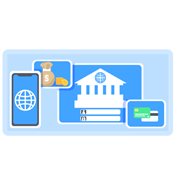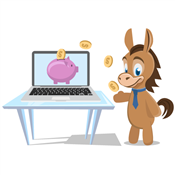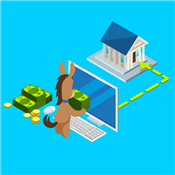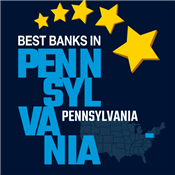Are Online Banks Safe?
Online banks promise higher interest rates and lower fees. But there are risks to online banks almost no one talks about.
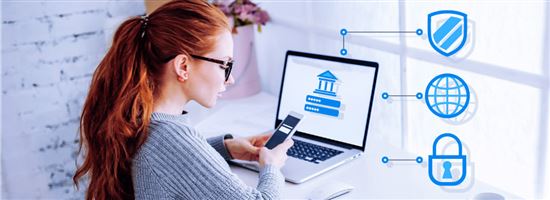 |
You've probably noticed a lot of no-fee high yield online bank accounts.
Here's why:
Online-only banks don't have the expensive overhead that physical banks do. In return, they pass along their savings to customers with higher interest rates.
But it can sound scary to put your money in a bank you can't visit.
Are online banks even reliable? And are you giving up the security of a big bank?
There are definitely legitimate reasons not to use online banking. But safety is actually not one of them.
Are Online Banks a Good Idea?
Online banks are safe. Like traditional banks, they are typically insured by the FDIC, which guarantees reimbursement of your account (up to $250,000) if the bank were to fail.
But there are drawbacks to using an online bank. If you want to talk to somebody about your account, you'll have to use the online customer service or call them by phone.
With a traditional bank, you can walk into a local branch.
But an online bank typically offers higher interest rates and has less fees. With the same FDIC insurance as traditional banks.
Online Banks Security
So, say your bank is FDIC-insured. This provides some peace of mind that your money is safe. But what about your financial and personal information?
Fortunately, online banks take the same information security measures that traditional banks do. As cyber attacks and security breaches become more common, banks must ensure their security is constantly evolving.
Most, if not all, online banks offer the following security features (and more):
- 256-bit AES encryption
- Two-factor authentication
- Fraudulent activity alerts
- Automatic account freeze if suspicious activity is suspected
- Regular account monitoring
- Automatic time-out after a certain amount of idle time
The best browsers for online banking are Firefox, Google Chrome, and Safari. But the best browser is also the one you update regularly. Most online banks require at least Firefox 51 or higher or Chrome 56 or higher for maximum security. And be sure to take necessary precautions like using appropriate anti-virus software.
The Risks of Online Banking
Online banking carries some risk, but if you have an FDIC-insured account, your money is protected. Banks that get hit by hacking attempts often increase their security after such an incident.
If you are a victim of hacking, report the incident to your bank immediately. This ensures that you get proper reimbursement.
Federal law requires you to report the incident within 60 days, but the sooner you report it, the better. Sometimes the longer you wait, the higher your liability in the transaction becomes.
As far as safety is concerned, safety is based on FDIC insurance. In my opinion, no one should deposit funds in an uninsured bank.
Robert Solomon, Clinical Professor of Law at UC Irvine
Just how do attackers get access to your online accounts? Here are a few ways:
- Phishing
Attackers often send emails that look legitimate but aren't from the bank itself. If you click on the link, it gives the hacker access to your computer or sends you to a website that asks for personal information. If you provide the information, you give access to your accounts. - Keylogging
Conducting your online banking in a public space may put you at risk of keylogging or a hacker monitoring your keystrokes. They use the information you enter to hack into your accounts and get access to your bank funds. - Shady Apps
Third-party apps that seem harmless may hold spyware that gives attackers access to your bank accounts. Before you download any apps, including innocent game apps, look at the reviews and consider the source. Even the most legitimate-looking apps can be dangerous.
How to Protect Your Online Banking
73% of Americans use online and mobile banking.[1] It's important to protect yourself from online account hacking. Here are a few simple ways:
- Update Your Software
Always update your operating software and anti-virus software. Don't ignore notifications when they pop up on your computer. - Have the Latest Anti-Virus Software
Be sure to install a new anti-virus program every year—or renew your current one. You never want to be without anti-virus software. - Update Your Apps
If you bank on a mobile app, make sure you do all of the latest operating system and app updates. - Add Two-Factor Authentication
Most banks offer two-factor authentication. On your computer, you may add the option to email or text a code to yourself. On your mobile app, you can do the same thing or add face recognition as your second authentication factor. - Avoid Banking in Public
Using an internet connection other than your own safe Wi-Fi network can put you at risk of fraud. If you have to conduct a banking transaction in public, ensure that the connection is secure before doing so.Are banking apps safer than websites?
Banking via the bank's website from your home computer with proper protection and your own Wi-Fi is typically the safest bet. If you are out in public, though, using the bank's app and a 3G or LTE connection is a safer bet than jumping on a public Wi-Fi connection. - Don't Click on Links
If you receive an email or text message that looks like it's from your bank, confirm it first. Don't click on the link without verifying, as you could be opening the door for hackers.
Online banks offer the highest APYs, FDIC insurance up to $250,000, and all the same information security measures of a traditional bank.
However, if you want multiple financial products, in-person support, and business benefits, check out larger commercial banks or local credit unions instead.
What Experts Say
CreditDonkey assembled multiple industry experts to share their insight on the safety of online banking.
Here's what they said:
The Reasons Online Banks May Be Better
Online banks have many benefits. While you should shop around to compare features, you'll often find many of the following benefits:
- Lower Fees
Online banks have lower overhead, which allows them to charge fewer (or no) fees. Look for free checking and savings accounts online and enjoy the savings. - Higher Interest Rates
The lack of overhead also allows online banks to offer higher interest rates. Many have minimum balance requirements or offer tiered rates (the higher your balance, the higher the interest rate). - 24/7 Options
Since you don't have to visit a branch, you never have to wait until the bank is open. You can bank any time of day or night that's convenient for you. - Better Technology
Online banks often have the edge in security, since they only operate online. Physical branches have more to worry about and may not offer the highest level of security for their online and mobile services. - More Customer Service Options
Online banks typically offer phone, email, and online chat options for more hours than you'd get from a physical bank branch.
Downsides of Online Banks
- No Physical Branches
This means no in-person customer support and possible difficulty depositing cash. If you think you'll need to deposit cash often or prefer to talk to a teller in person, online banks may not be right for you. - Fewer Product Offerings
Larger, traditional banks usually offer other financial products such as mortgages, insurance, and various types of financing. If you're hoping to bundle multiple products under one bank, go traditional.
Bottom Line
Online banks are safe as long as you choose the right one. Confirm that the bank is FDIC insured and offers industry-standard security measures. In addition, make sure you do your part in keeping your information safe, like frequently changing passwords and avoiding suspicious emails.
But if you prefer or need in-person support, multiple financial products, and easy cash deposits, you may want to opt for a traditional bank or local credit union instead.
References
- ^ American Bankers Association, Survey: Bank Customers Preference for Digital Channels Continues to Grow, 11/5/2019
Write to Kim P at feedback@creditdonkey.com. Follow us on Twitter and Facebook for our latest posts.
|
|
|
